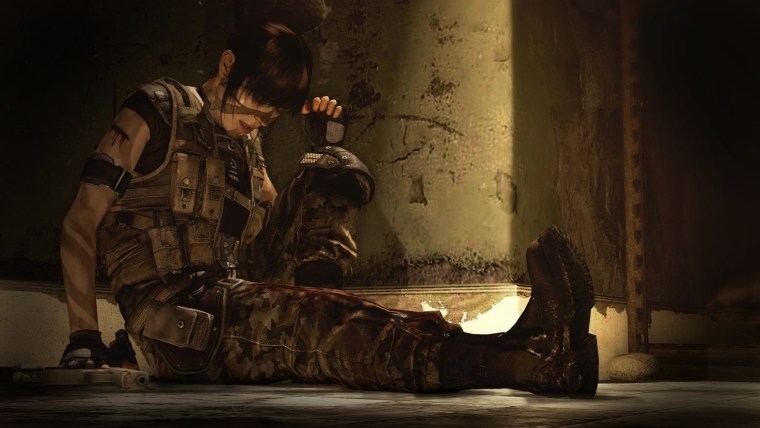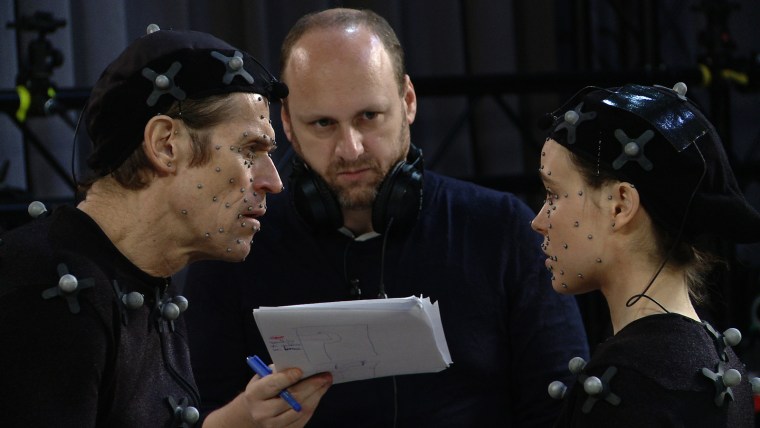Even for the people who make them, video games can be incredibly confusing. There are few better examples of this fact than Quantic Dream, a French video game studio that's been producing games since 1997 so peculiar and movie-like that many gamers have been forced to ask: are they even games at all? With the release of the company's highly anticipated "Beyond: Two Souls" little more than a week away, the answer is "not necessarily," David Cage, the studio founder and creative director, told NBC News.
"We called 'Heavy Rain' an interactive drama, for whatever that's worth," Cage said, referring to the company's last title, which was released in 2010 to critical acclaim.
"So I guess that makes this ['Beyond'] the next-gen interactive drama?" he added, laughing. "We feel less and less comfortable with the word[s] 'video games.' We don't know what it means anymore."
If you've played or watched any of "Heavy Rain," you'd know what he means. The game told a stylish and sombre film noire story, complete with four playable characters who could live or die depending on what players decided to do with them. Compared to a game like "Call of Duty," it was a revelation, but not one all gamers were comfortable with. The game did away with many things considered central to the form, and forced players into strange situations, such as when they had to continuously press the "X" button to call out for one of the character's lost children. And with "Beyond," Cage said that the studio is only going further down this path.
"We don't have any 'game over' situation in the game," Cage said, "no point where you fail and have to start the level over again; we don't think that's very satisfying. Instead, 'Beyond' actually gives consequences to your failures, so everything becomes very natural, very fluid, very dynamic."
"Beyond" tells the story of Jodie Holmes, a young woman played by Ellen Page, who learns at a young age that she is being followed by a supernatural entity she starts to call Aiden. Having a spectral otherworldly being understandably gets Jodie into trouble, and eventually she finds herself being poked and prodded by scientist Nathan Dawkins, played by Willem Dafoe.
That's when things start to get really crazy. Cage wouldn't give too many details about the game's story, saying that he wanted players to be able to experience everything for themselves, but he noted that the game will follow Holmes through 15 years of her life and have 23 different endings.

This sounds ambitious, no doubt. But the craziness of the concept has given critics pause. Even other story-driven games like "BioShock Infinite" and "The Last of Us" don't give players that much control over the narrative for a simple reason: as "BioShock" creator Ken Levine has famously put it, narrative storytelling and gameplay can make strange bedfellows. A game like "Grand Theft Auto V" might let players take part in thrilling heists, but how do its authors make room for all the times that players just want to run around stealing cars?
Cage dismisses this concern, saying that game developers have chosen to limit their own creative potential.
"The thing is: what do you mean gameplay?" Cage said. "It's usually based on mechanics, and it means violence; it means that you have to justify hordes of people attacking you all the time."
An app in lieu of controller
For "Beyond," Cage said he deliberately chose not to build many core mechanics into the game. Instead, different scenes require players to use the controller in dramatically different ways, and Quantic Dream even developed an app for iOS and Android devices that can be used in lieu of the PlayStation 3's standard DualShock controller in order to make it "accessible to the widest possible audience."
Turning an iPhone or tablet into an input device for the PlayStation 3 might make "Beyond" seem like it's tearing down the last fortress that gamers have against the onslaught of mindless "casual" games like "FarmVille" and "Candy Crush," and Cage admits that his work has made him some enemies in the industry. His constant use of the word "emotion" whenever he's talking about games has already turned him into a meme, after all. But the one question he said he gets that truly bothers him is when people ask: Why don't you just make movies?
"Nothing has been done in regards to interactive storytelling in games," Cage said. And rather than try to repeat the artistic successes of the past, he said he wants to be "one of the pioneers" who shows how developers can focus on something other than "building more violent games."
"It's an empty place," Cage said. "So you just have to go into the desert and look for gold."
Yannick LeJacq is a contributing writer for NBC News who has also covered technology and games for Kill Screen, The Wall Street Journal and The Atlantic. You can follow him on Twitter at @YannickLeJacq and reach him by email at: Yannick.LeJacq@nbcuni.com.
